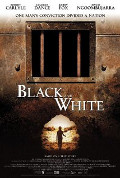
Directed by
Craig Lahiff
99 minutes
Rated M
Reviewed by
Bernard Hemingway

Black And White (2002)
Synopsis: Max Stuart (David Ngoombujarra) an Aboriginal is sent to trial in Adelaide in 1959 for the rape and murder of a young white girl in Ceduna. The Crown Prosecutor (Charles Dance) has staked his career on a swift conviction and David O'Sullivan (Robert Carlyle) and his partner (Kerry Fox) have the job of defending him.There has been a spate of films recently dealing with the Aboriginal/white Australian issue either in a historical (Rabbit Proof Fence,The Tracker) or contemporary context (Beneath Clouds, Australian Rules). All have been excellent and all have been distinctively Australian. Black and White, although it has related subject matter, unfortunately, cannot be included amongst that group.
The fundamental reason, I suspect, is that it is a British-Australian co-production. It is evident that there has been a very conscious effort to remain even-handed here, two of the 4 main roles going to the Brits and 2 to Australians, one producer Australian, one producer British and so on but, probably not intentionally, the net effect is to de-nationalize the film. The British producer, ex Richard Branson partner, Nik Powell, was responsible for the recent Last Orders which was directed by Fren Schepisi so this is a polished effort. But that's where it lost me - the heat has been taken out of it and replaced with a presentable blandness which may work well in the UK market but eviscerates its immediacy and frustrates identification from an Australian perspective. (Colin Friels actually adopts a strident Australian accent to inject a bit of local colour). Like the Adelaide exteriors which are shot close to eliminate any anachronistic elements, this film is disconnected from its place.
Compounding (or at the heart of) the problem is Louis Nowra's script which, perhaps because it is trying to cover so much material, is often superficial and sometimes jarring. Thus, we flit through the protracted legal process,and move from Adelaide to London and back again with virtually no visual acknowledgement of the passage of time, whilst Nowra has Stuart uttering Zen-like statements on his impending demise. And, returning to the point about the film's lack of groundedness, there is a curious lack of information about the O'Sullivan and Devaney characters. We never find out why O'Sullivan is driven to defend Stuart, why Devaney drinks, or what is their relationship (there's fire here but no smoking it seems). On the other hand, the film title's clever play on the race issue and the truth issue is well developed, although perhaps tending to be overdone one feels as we progress to the latter stages.
Robbie Carlyle is always good value but his performance, whether in actuality or as result of the editing is seriously affected by the schematic narrative. As his partner, Kerry Fox wears the same cloth and the somewhat caricatural performances of both Charles Dance as the Crown Prosecutor and David Ngoombujarra would be more suited to the stage. As for Ben Mendelsohn as Rupert Murdoch, well I'm sure Rupert's never looked so punk. The film is skilfully photographed and the production design is spot-on.
As a courtroom drama this is no Breaker Morant but for all its flaws its strength is that it is a fascinating story and one which we can be grateful has been brought to our attention, even if it was in so dutiful a fashion.

Want more about this film?


Want something different?




